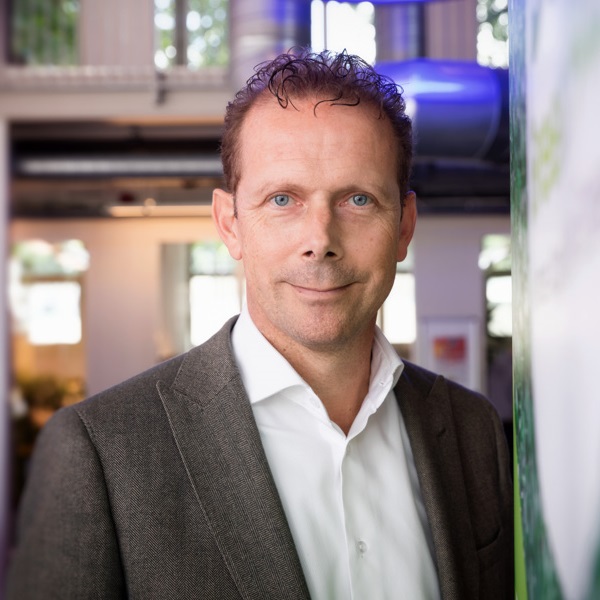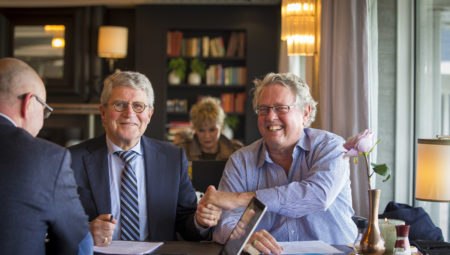Ten to one the concepts of circular and biobased will occur repeatedly in a vision paper. The view that it is time to change course dominates not only policy documents but also strategic company visions. And that will happen, Rob Zoetemeyer from Biobased Delta assures us. ‘As a country, the Netherlands is extremely fossil-based. Just look at the chemical industry. In the long run, it will be impossible to stick to fossils due to laws and regulations and CO2 prices. If the industry does not become circular or biobased, it will disappear. And that means we will lose our prosperity. We have no choice.’
300 million
The government has been fully aware of this for a while now and a lot of government funds are therefore being put to use to stimulate biobased initiatives. In 2016, a total of 300 million euros were involved in biobased projects in the business sector. The Dutch central government contributed 100 million of this through the Dutch Promotion of Research and Development Act (WBSO) and incentive programmes (see box). What do those millions every year deliver in terms of activity? ‘What we see,’ says Kees Kwant from RVO, ‘is that more and more businesses are becoming involved in biobased projects. However, many of those companies are in the phase of technical research. What we keep on saying, and this is proven by the sample projects presented by the provinces, is that certainly businesses are busy, but marketing the products is a problem. The market is only small and we are not earning much from it yet. The implementations are not yet present, and the market conditions are not what they should be. That makes things difficult.’
Rob Voncken of Green PAC, a hot spot for chemical innovation in Emmen which concentrates on biobased and circular materials, has the same experience. ‘In the five years of Green PAC we have involved more than 70 SMEs in projects, of which around 40 in BBE projects. These are still mainly small projects. A great deal of money has been invested in research and development. After all the investments and delays, I think that biobased projects are now technologically ready to break through. Now we have to find business cases for them that can compete with fossil-based rivals. Here and there you see successful business cases, such as biomass residues which are upgraded for heat production or roadside grass clippings for paper and composites. But many applications are not cost-effective yet. The issue now is for demand to grow.’ In Limburg, the network organisation Source B, as part of Brightlands, is the driving force for biobased initiatives. ‘The biobased eco system is growing,’ according to member of the Provincial Executive Joost van den Akker, ‘the SME is coming on board more and more. Several dozen SMEs are involved in our projects, which range from surveys to pilot and demonstration projects. It is happening step by step. A number of leaders have had commercial success, and that creates stimulus. To broaden the interest, we still need to make more progress. We are in the phase of building up.’ Zoetemeyer, who supports around 150 large and small enterprises with the Biobased Delta, also acknowledges this. ‘Of course there are fully developed sectors like the paper, cardboard and wood industry and the bio-energy sector, but the industry for biomaterials and biochemicals is still small. Despite the enormous growth vitality.’
Do not miss the boat
Countless SMEs have thus taken their first steps on the biobased journey. For the most part, the projects have not yet resulted in a market breakthrough. Let alone the emergence of a real biobased economy. Are all those funding flows from the government to the business sector actually worth it? Kwant: ‘You tell me. We are doing the right thing. Biobased can deliver a great deal. We are investing now so we do not miss the boat, but that boat should not be too late itself. There is a certain degree of impatience. We have to accelerate the market introduction, and businesses should be working on this more consciously. Luckily some companies are leading the way. The fact that it is not going any faster is due to the government and the consumers.’
Voncken disputes the idea that it is a waste of money. ‘We did an impact study and the scores are good. Businesses are going to make innovative products, which creates employment, students start their own businesses and the knowledge flows back into education. It is a highly efficient way to spend government funds.’ Van den Akker is of the same opinion: ‘It is definitely effective. And it is not only government funds, a lot of private money is being used as well. It is only logical that as a government you provide extra incentive at the start.’
Buying green
The question remains whether the government can put its money and its energy to more effective use. ‘The problem is not the supply,’ Zoetemeyer is convinced, ‘but rather the lack of demand. A government that buys biobased products is the best way to help boost the market. There are more than enough biobased products: we have an entire collection of dozens of products that you can simply buy. Go out and buy them: that will help the SME a lot. If governments included preferred biobased products in their procurement policy, that would be intrinsic evidence of their support for biobased. That is not happening enough, despite the exceptions like the Province of Zeeland and the municipality of Bergen op Zoom.’ According to Voncken, that role of buyer is actually more essential than the role of financial backer. ‘With projects like the biocomposite bicycle bridge, in which we participate as Green PAC, you see that it is impossible to make it cost-effective if the government does not take action as launching customer. This role of the government is often more important than providing a subsidy.’ The extent of biobased purchasing is still modest, no more than a few hundred thousand euros; the Monitor informs us that it will require considerable stimulus and growth in the coming years. Kwant: ‘Green purchasing by businesses and authorities is quite successful. Consider Rijkswaterstaat (Directorate-General for Public Works and Water Management) that procures biobased fencing or green bitumen. Or the Mars corporation that uses biobased wrappers. That is a deliberate decision, even though it is more expensive. These are hopeful signs which we can also try to stimulate with our programmes.’
Funding for scale-ups
There are more reasons why the market introduction is faltering and where the government can take on a more leading role as financer. And that is scaling up. ‘Creating a market mainly involves scale-ups,’ says Zoetemeyer. ‘After all, they are the ones who will be the first to enter the market with something new. Scaling up takes time, often more than you might think.’ He mentions the example of a plant pot for greenhouses that decomposes after time. ‘That worked fine until the customer said ‘Could you supply me with 10,000?’ That is the moment you need large machines that you have to set up properly. Bioplastic comes out of its mould differently to polystyrene. Scaling up is not something you just do in between.’
Scaling up not only takes time, it also costs a lot of money. Especially since every step requires more expensive processing equipment. ‘A lot of money is spent in the Netherlands on technological development, so on start-ups,’ according to Zoetemeyer. ‘Scale-ups have a much more difficult time obtaining funding. A few thousand euros from TKI BBE (Top Consortium for Knowledge and Innovation for the Biobased Economy Foundation) is not enough for biobased scale-ups, and nor is a subordinated loan of a million euros from a regional development agency. It is still not enough to get you a plant. The cost of a demo plant quickly adds up to a few million euros. The interest of banks is only roused for commercial plants. The government should set up a scale-up fund for the intermediate phase. The Province of Noord-Brabant is working towards that.’ Besides small-scale funding, Limburg set up a Brightlands agro venture fund one year ago. Van den Akker: A great deal still needs to be explored, but this kind of investment fund helps in the scaling-up process. ‘Slowly but surely it is heading in that direction.’
This kind of scale-up fund should be able to help businesses get their biobased products on the market faster, in Zoetemeyer’s opinion. ‘The time they currently lose through presenting their pitch to dozens of people is time they cannot devote to scaling up their product.’ And according to Zoetemeyer, it would also help if smaller companies did not have to pay full price for the use of equipment.
Managing expectations
Isn’t it taking too long? Are governments and other stakeholders applying pressure to see some results? ‘I don’t have that feeling,’ states Van den Akker. ‘We are well on target. A transitional process simply cannot be realised overnight.’ It is much more that the businesses themselves are impatient. ‘It is difficult to involve the SME in long-term projects,’ notes Voncken. ‘Their reasoning is based on the perspective of a good, swift business case. That is a logical focus. Once you have them on board, their involvement and appreciation are significant. Naturally this difference in perspective also applies to other sectors, but with biobased you are trying to get something going that is not automatically economically viable.’ But patience is a virtue. ‘You only have to read Agro&Chemie to see how projects are experiencing delays. Innovation simply always takes more time than expected. You have to persevere, be creative, go down new paths.’
According to Zoetemeyer, it is also important to manage expectations. ‘I can see that entrepreneurs are impatient. They are too optimistic. They think that they can already get on with demonstrations when all they have is a prototype. And then they believe they will be on the market in two years, while it will take another four to five years, with all the accompanying pitfalls. You have to go through that learning curve. A greater sense of reality would help too. Because if your business plan is too optimistic, the financer also becomes impatient when it starts taking longer.’
Boost
Besides financial support, companies also receive business support from Biobased Delta, BBD, Green PAC and Source B. They organise thematic workshops and make contact with other companies, financers, municipalities and provinces. Is that necessary? ‘Yes,’ says Zoetemeyer, ‘because companies have to fight against optimised fossil-based products and conservative buyers. The SME cannot take this all on by itself. They have to compete against a business sector that has been around for 100 years and that receives incentive. We help by promoting biobased products and biobased purchasing.’
‘The business sector cannot handle it independently,’ Voncken assures us as well. ‘That would take much longer. You have to work together as partners to set up new value chains. Our task is make connections, define projects so that they create value for businesses, so that they are convinced that the results will be interesting in the long term.’ Cooperation with different partners is necessary, confirms Van den Akker. ‘You have to look for unexpected combinations to get as high as possible in the value chain. That is why we work from different perspectives to help the SME: from the Brightlands campuses to provide access to knowledge, and from the province by offering financial support.’
Kwant acknowledges this as well. ‘We have to do this together. It would be sensible for the SME to seek cooperation with knowledge institutes. They can help to develop innovations. Cooperation between universities, universities of applied sciences and the SME is good, definitely on a regional level. Just as long as enough attention is paid to getting biobased products to the market.’







